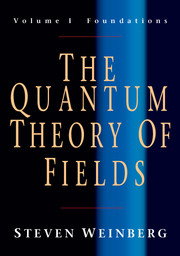Book contents
- Frontmatter
- Contents
- PREFACE
- NOTATION
- 1 HISTORICAL INTRODUCTION
- 2 RELATIVISTIC QUANTUM MECHANICS
- 3 SCATTERING THEORY
- 4 THE CLUSTER DECOMPOSITION PRINCIPLE
- 5 QUANTUM FIELDS AND ANTIPARTICLES
- 6 THE FEYNMAN RULES
- 7 THE CANONICAL FORMALISM
- 8 ELECTRODYNAMICS
- 9 PATH-INTEGRAL METHODS
- 10 NON-PERTURBATIVE METHODS
- 11 ONE-LOOP RADIATIVE CORRECTIONS IN QUANTUM ELECTRODYNAMICS
- 12 GENERAL RENORMALIZATION THEORY
- 13 INFRARED EFFECTS
- 14 BOUND STATES IN EXTERNAL FIELDS
- AUTHOR INDEX
- SUBJECT INDEX
7 - THE CANONICAL FORMALISM
Published online by Cambridge University Press: 05 May 2013
- Frontmatter
- Contents
- PREFACE
- NOTATION
- 1 HISTORICAL INTRODUCTION
- 2 RELATIVISTIC QUANTUM MECHANICS
- 3 SCATTERING THEORY
- 4 THE CLUSTER DECOMPOSITION PRINCIPLE
- 5 QUANTUM FIELDS AND ANTIPARTICLES
- 6 THE FEYNMAN RULES
- 7 THE CANONICAL FORMALISM
- 8 ELECTRODYNAMICS
- 9 PATH-INTEGRAL METHODS
- 10 NON-PERTURBATIVE METHODS
- 11 ONE-LOOP RADIATIVE CORRECTIONS IN QUANTUM ELECTRODYNAMICS
- 12 GENERAL RENORMALIZATION THEORY
- 13 INFRARED EFFECTS
- 14 BOUND STATES IN EXTERNAL FIELDS
- AUTHOR INDEX
- SUBJECT INDEX
Summary
Ever since the birth of quantum field theory in the papers of Born, Dirac, Fermi, Heisenberg, Jordan, and Pauli in the late 1920s, its development has been historically linked to the canonical formalism, so much so that it seems natural to begin any treatment of the subject today by postulating a Lagrangian and applying to it the rules of canonical quantization. This is the approach used in most books on quantum field theory. Yet historical precedent is not a very convincing reason for using this formalism. If we discovered a quantum field theory that led to a physically satisfactory S-matrix, would it bother us if it could not be derived by the canonical quantization of some Lagrangian?
To some extent this question is moot because, as we shall see in Section 7.1, all of the most familiar quantum field theories furnish canonical systems, and these can easily be put in a Lagrangian form. However, there is no proof that every conceivable quantum field theory can be formulated in this way. And even if it can, this does not in itself explain why we should prefer to use the Lagrangian formalism as a starting point in constructing various quantum field theories.
The point of the Lagrangian formalism is that it makes it easy to satisfy Lorentz invariance and other symmetries: a classical theory with a Lorentz-invariant Lagrangian density will when canonically quantized lead to a Lorentz-invariant quantum theory.
- Type
- Chapter
- Information
- The Quantum Theory of Fields , pp. 292 - 338Publisher: Cambridge University PressPrint publication year: 1995



